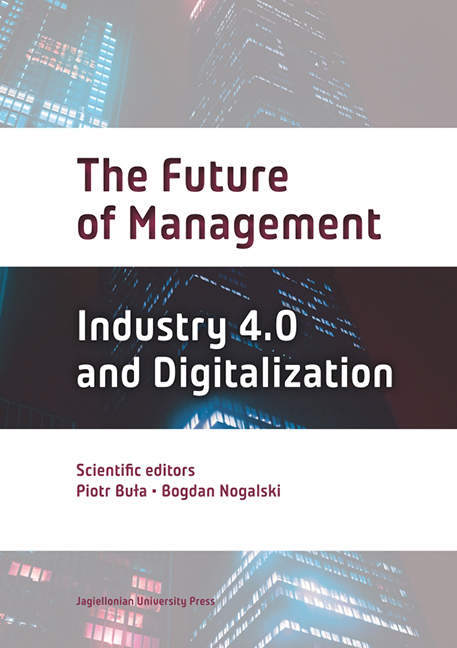Book contents
- Frontmatter
- Contents
- Preface
- Industry 4.0: Social Impacts and Operations Management Challenges
- Business Model Changes in the Presence of Challenges Brought by Industry 4.0
- Communication in Traditional and Network Organisation: Transformation
- Consequences of the Fourth Industrial Revolution in Social and Economic Development in the 21st Century
- Ideology, Trust, and Spirituality: A Framework for Management Control Research in the Era of Industry 4.0
- Renewable Energy through Industry 4.0 on the Example of Photovoltaic Development in Selected European Countries
- Employee Loyalty in the ICT Sector as a Challenge for Building Industry 4.0
- The Importance of Flexibility of Human, Tangible and Intangible Resources in Selected Production Entrepreneurships: Results of Empirical Research
- Challenges Posed for Universities by the Industry 4.0 Environment
- Big Data in Managing Marketing Communication
- Mathematical Risk Assessment Method in the Implementation of Logistic Processes
- Management and Digitisation
- Branding of Time as a New Direction in Tomorrow’s Management
- The Future of Branding
Communication in Traditional and Network Organisation: Transformation
Published online by Cambridge University Press: 16 November 2021
- Frontmatter
- Contents
- Preface
- Industry 4.0: Social Impacts and Operations Management Challenges
- Business Model Changes in the Presence of Challenges Brought by Industry 4.0
- Communication in Traditional and Network Organisation: Transformation
- Consequences of the Fourth Industrial Revolution in Social and Economic Development in the 21st Century
- Ideology, Trust, and Spirituality: A Framework for Management Control Research in the Era of Industry 4.0
- Renewable Energy through Industry 4.0 on the Example of Photovoltaic Development in Selected European Countries
- Employee Loyalty in the ICT Sector as a Challenge for Building Industry 4.0
- The Importance of Flexibility of Human, Tangible and Intangible Resources in Selected Production Entrepreneurships: Results of Empirical Research
- Challenges Posed for Universities by the Industry 4.0 Environment
- Big Data in Managing Marketing Communication
- Mathematical Risk Assessment Method in the Implementation of Logistic Processes
- Management and Digitisation
- Branding of Time as a New Direction in Tomorrow’s Management
- The Future of Branding
Summary
Abstract
I wish to compare the communication systems of network and traditional (hierarchical) organisations. The communication system as a tool supporting the management system may be, depending on the situation, a component delaying or supporting the implementation of the Industry 4.0 concept. The author also examines the factors that impact the smooth functioning of modern communication systems, focusing in particular on the role of ICT as a determinant of the operation of such systems. Communication systems of organisations depend on many factors, of which the main ones include: 1) the purposes that these systems are to serve and 2) the resources allocated to them. Communication systems are analysed in numerous works of literature on organisation and management sciences. In order to present communication in organisation management, the author applied a model approach simplifying managerial communication. The selection of analysed sources is anchored in the study of literature and research reports as well as in his own experience as a designer and researcher.
Keywords: communication systems, network organizations, models of communication
Introduction
We wish to compare the communication systems of network and traditional (hierarchical) organisations. The communication system as a tool supporting the management system may be, depending on the situation, a component delaying or supporting the implementation of the Industry 4.0 concept. The implementation of this concept requires a shift from hierarchical communication systems to the use of network solutions. We will also examine the factors that affect the smooth functioning of modern communication systems. We are particularly interested in the role of ICT as a determinant of the operation of such systems. Communication systems of organisations depend on many factors. The crucial ones include the purposes that these systems are to serve and the resources allocated to them. Communication systems are analysed in numerous works of literature on organisation and management sciences. In order to present communication in organisation management, we will employ a model approach that outlines managerial communication in a simplified way. The selection of analysed sources is anchored in the study of literature and research reports as well as in our own experience as designers and researchers.
- Type
- Chapter
- Information
- The Future of ManagementVolume Two: Industry 4.0 and Digitalization, pp. 42 - 59Publisher: Jagiellonian University PressPrint publication year: 2022

